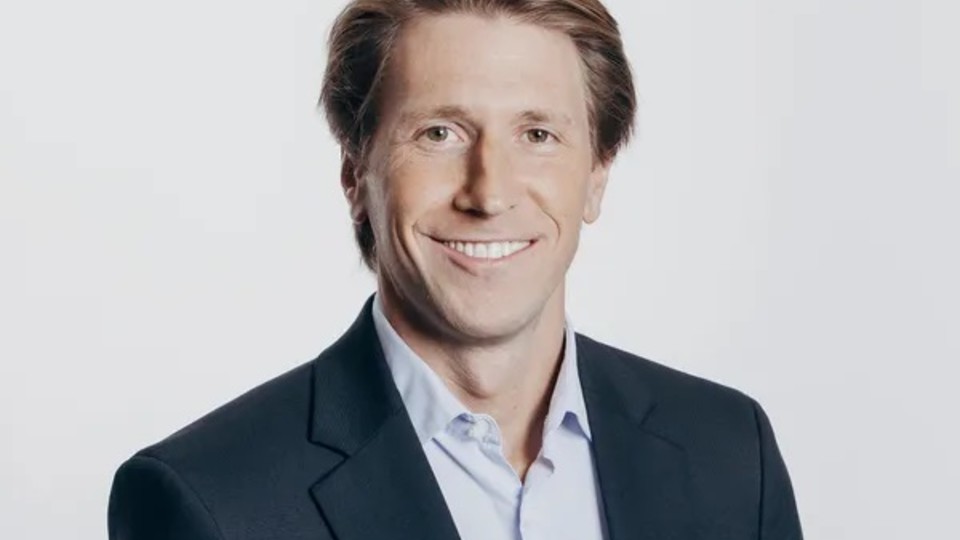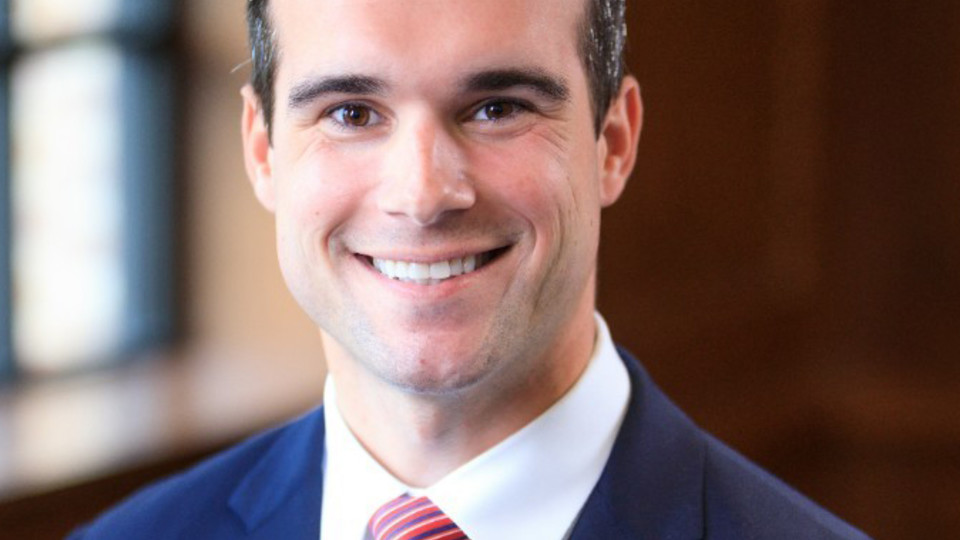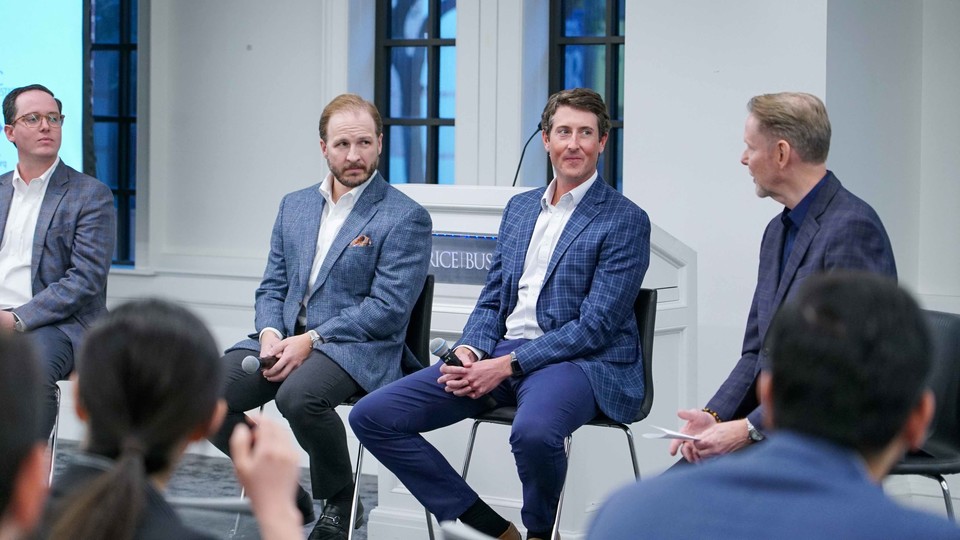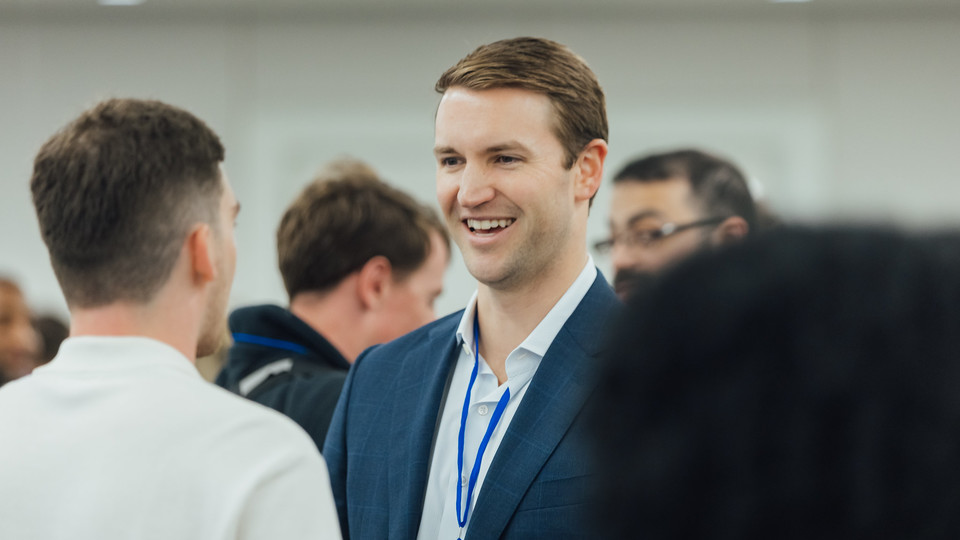Rice Business creates Hybrid MBA program to utilize benefits of both on-campus and online learning experiences
For working professionals who want to pursue a Master of Business Administration degree with a flexible schedule, the new Hybrid MBA program at Rice University’s Jones Graduate School of Business opens this summer.


For working professionals who want to pursue a Master of Business Administration degree with a flexible schedule, the new Hybrid MBA program at Rice University’s Jones Graduate School of Business opens this summer.
The Hybrid MBA — the first of its kind in Texas — preserves the benefits of the in-person educational experience while leveraging the flexibility offered by online learning through live Zoom sessions and asynchronous course content. The new program will also utilize the same highly recognized faculty as other Rice Business programs in developing and delivering courses.
Students will attend class in person on campus once a month, with online education during the weeks between. Tuition includes residency at a hotel close to Rice during on-campus weekends and immersion weeks so students can connect with classmates and skip the commute.
"After researching demand for MBA programs, we found that prospective students want an in-person experience but not one that meets every week," said Peter Rodriguez, dean of Rice Business. "Our Hybrid MBA makes it easier for working professionals in Houston and regionally to earn a Rice MBA with the on-campus experience they want.”
The 22-month, 54-credit program will provide students with all of the advantages of the Rice curriculum, community, campus and faculty. It begins in July with a one-week immersion on campus, followed by the monthly on-campus meetings, which will align with other Rice MBA programs to provide opportunities for hybrid students to interact with those in other programs as well as take Professional Weekend MBA electives. There is one immersion week at the end of the first year, and the program concludes with a one-week Global Field Experience in May 2025 before students return to campus for graduation.
To learn more about the Hybrid MBA, click here.
Rice Business will continue to offer its top-ranked MBA programs: Full-Time, Professional, Online and Executive MBA.
You May Also Like

Rice University’s Jesse H. Jones Graduate School of Business today announced the launch of its Graduate Certificate in Healthcare Management program, a 10-month, credit-bearing professional credential designed for current and aspiring leaders seeking deep expertise in the business of healthcare.
Houston research: Navigating diversity of thought among company leadership
Rice Business professor Daan van Knippenberg and colleagues performed a meta-analysis and found that strategic dissent, often thought to provide positive outcomes to their organizations, actually does the opposite.

10 Lessons from a Houston Business Titan
When Charles Hurwitz, CEO and President of Houston-based MAXXAM, Inc. addressed a “thought leadership” discussion at Rice Business recently, you can be assured of one thing. Everyone listened.

3 out of 4 parents say social media is a major distraction for students, according to new study
The vast majority of parents believe social media is a major distraction for students, according to a new nationwide study conducted by Vikas Mittal, a professor of marketing at Rice Business. The online study surveyed a nationally representative sample of more than 10,000 parents of K-12 students.

The vast majority of parents believe social media is a major distraction for students, according to a new nationwide study.
The online study, conducted in November and December, surveyed a nationally representative sample of more than 10,000 parents of K-12 students. An overwhelming majority from across racial groups — African American (70%), Asian (72%), white (75%), Hispanic/Latino (70%) — agreed that social media is a distraction.
Parents of children who attend private schools (82%) were more likely to see social media as a distraction than parents of children in public schools (73%) or charter schools (73%) or those being homeschooled (67%). Interestingly, parents with children in high school (74%), middle school (73%) and elementary school (73%) were equally concerned about the issue.

School leaders are also worried. Last week, Seattle Public Schools sued the tech giants behind TikTok, Instagram, Facebook, YouTube and Snapchat, claiming they’ve created a youth mental health crisis. Most schools prohibit cellphone use in the classroom.
“Suing social media companies or banning cellphones in classrooms may be trendy, but is unlikely to help students,” said Vikas Mittal, a professor of marketing at Rice's Jones Graduate School of Business, who conducted the 2022 Collaborative for Customer-Based Execution and Strategy (C-CUBES) K12 Parent Voice Study.
Cellphone usage and social media browsing is ingrained among school-age children, he argues. A Pew Research Center study of teens found more than 95% have access to a cellphone, 94% use the internet almost constantly or several times a day and 54% say it would be hard for them to give up social media.
“Many years ago, schools were in a race to provide every student with internet access,” Mittal said. “It was seen as a panacea for improving academic achievement. That policy seems to have had some unintended consequences.
“The distractive effect of social media is only exacerbated due to widespread internet access, and today’s school leaders must thread a difficult needle,” he continued. “They must continue providing students with high-quality and equitable internet access due to its potential educational benefits.”
“Policies like curtailing cellphone usage in classes to ensure teachers can teach effectively are necessary but quite limiting,” he added. “School leaders must proactively work with parents to educate children about the potential downside of social media usage and teach them strategies to self-manage potentially addictive behaviors associated with social media.”
You May Also Like

Rice University’s Jesse H. Jones Graduate School of Business today announced the launch of its Graduate Certificate in Healthcare Management program, a 10-month, credit-bearing professional credential designed for current and aspiring leaders seeking deep expertise in the business of healthcare.
When Conflict Leads to Worse Outcomes
Conflict among senior managers leads to worse organizational outcomes.


Based on research by Daan van Knippenberg (Rice Business), Codou Samba (University of Tennessee, Knoxville), and C. Chet Miller (Houston)
Key findings:
- It’s common wisdom among management researchers that senior management teams with diverse opinions about the strategic direction of the company make better decisions — even when there is conflict.
- A Rice Business professor was part of a research team that came to the opposite conclusion. After integrating data from dozens of scholarly articles, the team determined that diverging views about a company’s strategic direction among senior managers has a negative impact on strategic decision making and firm performance.
- Whereas diversity of thought can be an asset, this does not apply to diversity of opinion about the firm’s strategic direction among senior managers.
For the past 40 years, management researchers have assumed that diversity of opinion about company strategy, even when it causes conflict among senior managers, leads to higher-quality strategic decisions and improved firm performance.
It turns out there isn’t evidence to support that belief.
Rice Business Professor Daan van Knippenberg has spent his career studying topics related to team performance, decision making, diversity and conflict. When a research team led by Codou Samba, an assistant professor at the University of Tennessee, Knoxville, approached him with an offer to test longstanding assumptions about conflict related to company strategy in senior management teams, he jumped at the opportunity.
In his experience, the business case for diversity is strong, but it comes with caveats. “Diversity of perspectives can lead to better solutions to complex problems, but only when team members are open-minded enough to listen carefully to each other and really integrate another point of view into their decision-making process,” he says. This does not seem to apply to differences in opinion about what company strategy should be.
When managers dig in their heels and refuse to consider and integrate other perspectives, that two-way door of communication slams shut and conflict ensues. “The popular idea that conflict is actually good for firms went against all my knowledge,” says van Knippenberg. “It’s annoying that this idea has floated around in my field for so long when the evidence really points the other way.”
The team led by Samba, which also included C. Chet Miller, a professor at the University of Houston, conducted a quantitative summary and integration of 78 papers that provide data about strategic dissent — a term used to describe diverging opinions about strategic goals and objectives on senior management teams — and its influence on strategic decision making and firm performance.
Every paper that made a prediction about strategic dissent (only a few did not) posited that strategic dissent leads to better outcomes for firms.
In their paper, the research team used a deep well of empirical data to demonstrate that the opposite is true. Turning common wisdom on its head, they found that strategic dissent among senior managers actually leads to lower-quality decisions and impaired firm performance.
The authors identify two major reasons for the negative impact of strategic dissent on firm outcomes.
First, strategic dissent causes relational breakdown among senior managers. “If managers walk away from a team meeting thinking they just had a conflict instead of a productive discussion, the outcome is rarely positive,” says van Knippenberg. The two sides retreat into their respective corners, believing the other side to be wrong and closing their minds to further information.
Second, strategic dissent leads to less relevant information being exchanged among managers. Inevitably, this blockage impairs the decision-making process. If a marketing director and an operations director are at odds, for example, they are less likely to share the marketing- or operations-specific information that is needed to make an optimal team decision.
Teams can benefit from diversity of thought, but it is not always clear what conditions need to be in place for that to happen on senior management teams that disagree about the firm’s strategic direction. CEOs would do well to realize that it takes an effortful investment to foster open-minded discussions of diverging views on the organization’s strategy, to create an environment that encourages members to express dissenting perspectives while absorbing the perspectives of others, and to prevent vested interest and power dynamics from determining the outcomes of such discussions.
Van Knippenberg, et al. (2018). “The Impact of Strategic Dissent on Organizational Outcomes: A Meta-Analytic Integration,” Strategic Management Journal.
Ph.D. Area Advisor - Organizational Behavior
Never Miss A Story
You May Also Like
Keep Exploring
Houston research: Your tools can reflect your workplace skills
Want to get better at a task? It may be possible to shop — or imagine — your way to success. This Rice Business Wisdom article was based on research from Jaeyeon (Jae) Chung, an assistant professor of marketing at Rice Business.

Generations of Rice Grads feat. Chuck Yates ’94
Season 3, Episode 7
Chuck sits down with host Scott Gale '19 at the Digital Wildcatters Podcasting Studio right here in Houston to talk about his long-standing ties to Rice, pursuing a career in investment banking, his connections to Nashville and the music industry, and his hopes for rebranding the energy industry.

Owl Have You Know
Season 3, Episode 7
Chuck sits down with host Scott Gale '19 at the Digital Wildcatters Podcasting Studio right here in Houston to talk about his long-standing ties to Rice, pursuing a career in investment banking, his connections to Nashville and the music industry, and his hopes for rebranding the energy industry.
Watch
Listen
Subscribe to Owl Have You Know on Apple Podcasts, Spotify, Youtube or wherever you find your favorite podcasts.
Episode Transcript
-
[00:00] Intro: Welcome to Owl Have You Know, a podcast from Rice Business. This episode is part of our Pivot Series, where guests share stories of transformation in their lives and careers.
[00:13] Scott: Welcome to the Owl Have You Know Podcast. I'm your host, Scott Gale. I'm here with Chuck Yates, Rice undergrad '91, Rice Business School '94.
[00:23] Chuck: Now, did I get selected because I didn't pay my parking tickets and this is like my penance to the university?
[00:30] Scott: Cat's out of the bag, Chuck.
[00:33] Chuck: All right.
[00:33] Scott: I've come here with a collection.
[00:35] Chuck: There we go. There we go.
[00:36] Scott: It's a privilege to be here kind of on your home turf.
[00:41] Chuck: Your home turf as well.
[00:42] Scott: Yeah, we're at home.
[00:42] Chuck: This is, this is the home field. For those of you who don't know, Scott and I both have podcasts published by Digital Wildcatters, and this is the Digital Wildcatters Podcasting Studio.
[00:52] Scott: This is it. I encourage you guys to check it out. We'll talk a bit about “Chuck Yates Needs a Job” podcast. I want to hear a bit more about the origin story around that. But I wanted to, kind of, just start a little bit chronologically and go back, because the Yates family has a lot of connectivity with Rice University. Can you share a little bit about, kind of, some of that family history?
[01:12] Chuck: Yeah. So, I'm Charles Wilbur Yates III. Charles Wilbur Yates, Sr., so my grandfather, was class of '30, '31, '32, somewhere in there. I should probably know the date. So, he went to Rice. Great aunt went to Rice in the late '30s. I don't think she got a degree. Or early '40s somewhere that she attended classes. Then you had mom and dad both graduate from Rice in the early to mid-'60s. You had Uncle Terry graduate from Rice in the late '60s. Then you had me, brother Jay, brother Kenny, all graduate from Rice in the '90s. You... ex-wife, Kim, I met at Rice. And then I think, in the divorce, I won the right to say it is still a Yates family degree, but I'm not sure of that.
[02:07] Scott: Double-check.
[02:07] Chuck: I’ll have to check the divorce decree on that one. And then the two sister-in-laws, Crystal and Becca, both went to Rice. And just while we're piling on Rice stats, multiple of us have multiple Rice degrees.
[02:22] Scott: So, when you were graduating high school and deciding to go to college, was it even a conversation or was it...
[02:27] Chuck: I didn't have a choice, didn't have a choice. So, this was kind of funny. I decided sophomore year in high school that I was going to go to Harvard and went and announced that to my parents. Scared the hell out of my mom. She's like, "Oh, my God, my poor little baby from Richmond, Texas is going to go off to the East Coast, is going to become a rabble-rouser, liberal, marry Amy Carter, and start protesting and all this."
And unbeknownst to me, Dad says, "Don't worry, I got this." And I said... Dad said, "You know, Harvard's a really good school, Chuck. If you go there, I'll even pay for you to go there, but you got to go visit. You can't just show up on campus." I go, "Okay, dad, I'll go next summer." And dad goes, "Nah, why don't you go over Christmas break?" Mom says, to this day, the hardest thing she ever did when parenting me, they let me get on a plane to go to Boston, Massachusetts in the dead of winter. And it was 73 degrees in Houston, Texas. I didn't take a coat. I didn't know any better. I mean, I was just like, it's 73 degrees in Houston. Why do I need a coat? I got up there, and I had like one pair of jeans. Everything else I packed was shorts. And my mom knew this. And so, anyway, I got there and kind of walked around campus, you know, in my T-shirt. And I think I went and bought a jacket or something. So, I'm freezing to death. And Harvard is going, "Here is our latest building. It was built in 1796." And I was just going, "I don't think this is a place for me." Needless to say, I didn't get into Harvard, but I've changed the story so that, at the end of the tour, I walked into the admissions office and asked Harvard to tear up my application. That's a much better story, right?
[04:10] Scott: I like it. I like it.
[04:12] Chuck: Thank you.
[04:13] Scott: That's some great parenting approach by your parents as well.
[04:14] Chuck: Oh, I know.
[04:16] Scott: That's fantastic.
[04:15] Chuck: Typical Dad.
[04:19] Scott: So, you arrived on Rice campus. Obviously, you've got some familiarity. Can you share a little bit about your initial impressions having been on Rice campus and a bit of your journey through the business school?
[04:31] Chuck: The thing that was really cool about Rice that I think I gained some appreciation for, particularly, later in life, is the collection of intelligence that I was surrounded with at Rice, far and away, the greatest amount of intelligence I've ever been surrounded by. I mean, I worked in investment banking, I did private equity, which are supposedly the pinnacles of careers out there. And my freshman class at Rice had gazillion times the horsepower that I saw out in the professional world. I mean, just really, really smart people.
And I think the other cool thing about Rice, and it would be interesting to see my answer on this versus today's folks' answer on this, is when I went to Rice late '80s, early '90s, you were smart enough to get into Harvard, Yale. But generally, you couldn't afford it. So, Rice was the economic alternative to the Ivy Leagues. And so, what you wound up having is a bunch of middle-class kids that maybe got into Stanford or wherever but just couldn't afford it. Or you had some of them from a small town in Texas, etc. Because I think the tuition... I mean, it was a big deal. My freshman year, when tuition, I think, got raised to $4,000 a semester.
And so, that was kind of the character of Rice at the time. And what was great about it is it really wasn't a class system. Money didn't matter. You know, who knows what an Ivy League campus would look like? But I'm sure, at Yale, it matters what your last name is, how much money you had. And it just didn't seem to matter at Rice. It was more about how smart you were and what stupid pranks you could figure out to pull and stuff like that. So, huge amount of appreciation for that, particularly later in life because it kind of gave me a grounding of, where I... maybe not rightfully so, but I felt like I could walk into any meeting and not worry about it. You know, hey, who's my father? Or, you know, how much money do I have, or whatever? At Rice, you could walk into any meeting. So, I thought that was really cool about Rice. Did you have that vibe when you were there? What year were you?
[06:51] Scott: Yeah, I am a class of 2019. So, did the Executive MBA program at Rice.
[06:54] Chuck: Okay.
[06:56] Scott: And certainly found it to be approachable... like you're saying, just like the level of brilliance in the room. You're kind of looking around, like, how did I get in here? But just the, I don't know, just found that there was just, the class sizes were really small. There was just sort of like a humanity to it, in a way, that was unique. And I think, certainly through COVID, and as they've added like the online program and have kind of expanded classes, I think that one of those challenges is to kind of maintain that same feel, that kind of familial vibe.
[07:27] Chuck: Yeah. So, I got, I got a story along those lines. You know, during the '70s, Rice had about as bad a run in football as any university’s ever had. I mean, I think at one point we had lost 25 straight games or whatever. And, you know, God bless Ray Alborn who went to Rice with Dad, but he was kind of the coach during all that Rice alum, does good, takes over the program that never wins another game.
So, anyway, they fired Ray Alborn and they were looking for a new coach. This was early '80s. So, I think I was still in eighth grade. I wrote a letter to Norman Hackerman, who was the president of Rice, applying for the job as head football coach. And I detailed stuff out like I knew all the Dallas Cowboy statistics and that, one time, you know, when I was really young, I went to a Rice game and I was talking all about football, and the lady sitting behind me tapped my mom on the shoulder and said, "Your daughter sure does know a lot about football, you know."
It was, I mean, it was fairly tongue-in-cheek, the letter. Anyway, so I mailed it into Dr. Hackerman. I get a very nice written note. "Dear Mr. Yates. Thank you for your interest in the job. I have forwarded your letter to the committee making the determination. I wish you the best of luck. If there's anything I can do, Norman Hackerman," right?
So, about two years later. I'm on campus at a reception for a family friend. And Dr. Hackerman's in there, and I walk up and I go, "Dr. Hackerman, I don't know if you remember me. I applied for the football coaching job." And, you know, I'm like a sophomore in high school at this point. And he said, "Come here." And he kind of pulls me aside and he said, "Hell, son, I voted for you."
[09:14] Scott: That’s quite the endorsement.
[09:15] Chuck: Yeah, it was, it was really cool, so yeah.
[09:18] Scott: That's a cool confidence builder, going into the, into the experience.
[09:21] Chuck: Yeah. It's probably totally untrue. But anyway, he probably didn't, but it was nice enough. I was like, all right.
[09:25] Scott: That's awesome. Can you share a bit about, kind of, coming out of the program and launching your career, like, eventually, like you said, getting into investment banking and private equity? Can you tell a little bit about that early journey and what motivated you to get into that world?
[09:39] Chuck: Yeah. So, now, I'll be a little critical of Rice, or at least my time there. I mean very, very smart, all the people I was surrounded with. Professors really made you think. So, I thought that was great. There wasn't an undergrad business program of any sort, right?
[09:57] Scott: Right, they just launched it recently.
[09:59] Chuck: Yeah, they had managerial studies, which I mean was really just this compiling a bunch of statistics class, economics class, and all that. So, I really didn't know what I wanted to do. So, I kind of did what every political science major is. I defaulted into law school, right? So, I went to the University of Texas law school and figured out big, thick book, tiny print, no pictures. That's really bad. I dropped out after the first semester. And technically, I actually dropped out before the end of the first semester. But I feel bad, like, saying that I didn't even make it a semester. So, it's like...
And I just defaulted back into Rice Business School because I didn't know what to do. And what was cool about that is, for the first time, I had a real finance class. And to me, that was just my jam. I mean, I've always been a numbers type guy, really good at math. I actually kind of think in math, you know. As you talk, I break down things into numbers in my mind. It's sort of weird. I haven't heard about anybody else that does that. But that's kind of how it was.
And, you know, finance is really just translating accounting into value, right? I mean, at the end of the day, it's assigning risk, it's cost of capital, that sort of stuff, but at its simplest form. So, figured out that was my jam. And what was neat about it is I had this non-traditional-looking career path because undergrad, start and stop in law school, get an MBA, without any real true working experience. But it was amazing, the amount of Rice folks for such a small school that were in the finance world. And when I was interviewing for investment banks coming out of business school, Goldman Sachs was still private. It was a private partnership. And there were 133 partners. Five of them were Rice people. I mean, you know, arguably the most prestigious job on the planet. So, you just had a lot of Rice folks you were able to go talk to in that world. And so...
And one thing I'll say good about the Rice community is everybody takes your call, "Hey, I'm another Rice person." And there seems to be some commonality there that it'd be interesting if other schools to hear if they have it or not, because we certainly have it in Owl land.
[12:19] Scott: Yeah. Oh, absolutely, I think that's one of the features that kind of comes up again and again in describing one of the big advantages of being a part of the alumni base, is that anybody will take a call, like, it doesn't matter if there's a direct connection, some other alumni or whatever. It's like a cold call if you're connected to Rice, that there's a willingness to take the call. And I feel like people pay that forward.
[12:43] Chuck: Yeah, I know, it was interesting. So, arguably, the greatest venture capitalist in history is Burton McMurtry. Burton went to Rice undergrad, went to work for Sylvania in Silicon Valley, got a PhD at Stanford while he did it, became a venture capitalist, I think, as early as the mid-'60s. I mean, so really at the cutting edge of it. Microsoft only took venture capital from one firm, and they took it from... I believe the entity was called TVI because they wanted Burton McMurtry on their board, and, you know... so, all the great Rice Silicon Valley stories. Burton was here recruiting them, Jimmy Treybig, Kenny Oshman, you know, tick on down the list.
So, anyway, my dad went high school and college with Kenny Oshman who... big Silicon Valley success story, founded Rome. He's the ‘O’ in Rome, and they sold IBM for gazillion dollars and then had another startup with Echelon that did really well. My brother, Kenny, is named after Kenny Oshman. So, dad calls one day and they're supposed to be going out for one of the Oshman boys' bar mitzvahs. And dad says, "Yeah, we can't go. Your brother, Bobby, is sick." I'm the oldest of four boys. And brother Bobby is eight years younger than me. So, Bobby, at that time, may be, call it, 12 or 13. Yeah, we just can't go. But Bobby's sick, and I was like, "Well, I'll come take care of him, Dad. And you all can go to the bar mitzvah. I'll come home for the weekend to do it. And dad goes, "Really?" And I go, "But you got to do me a favor. You got to bring me Burton McMurtry's business card." And he goes, "All right."
So, at this bar mitzvah, you know, San Francisco, everybody on the planet's there. Dad walks up to Burton McMurtry and says, "Hey, I want to thank you. You're the only reason I'm here. And my son is watching his younger brother who's sick, and we didn't want to leave. But he said he'd come if I could get your business card." And Burton McMurtry said, "You know what? I don't bring business cards to these type things," takes out a cocktail napkin, writes his number on it, says, "Give that to your son." And anyway, every time Burton McMurtry would come to Houston on something, he'd take me to breakfast. I mean, here I am, just a Rice undergrad, and then a lowly investment banker, you know, working. He always took my phone calls and stuff. And so, I mean, he was on the board of Rice. It's McMurtry College, right?
[15:07] Scott: Yeah, yeah. I mean, what were some of the things in those quiet, one-on-one sessions with Burton over the years? Any kind of advice or perspective that stood out as you got to have that unique interaction, that coaching?
[15:19] Chuck: Yeah. It was kind of cool, kind of when I got into business school, figured out finance, you know, okay, private equity, venture capital, investment banking, the big allure of that. And I remember one time talking about it, then he goes, "Yeah, it's kind of cool, but on the other hand, you're never going to sleep." He's like, he's like, "You're going to be up worried all the time and all that." I was like, "Oh, okay."
The other cool thing that I didn't have an appreciation for, you know, he did venture capital, he did early-stage stuff. And one of the things he said is... that made his life a lot easier is he said, "You know what I've gotten to the point in my career is? I assume they can build what they say they're going to build." Because, engineers are really smart, software developers can really write software. So, I go, "Okay, great." And then I sit there, and I go, "Okay, this product, who cares?" And it's really about figuring out the market. Is there a market for it? Can you penetrate the market? What are the trade-offs with your product versus others? And he said, "That's what I spend my time worrying on." And, you know, at that point in my life, I was like, “No, can they build this machine?” And yeah, no, he's like, "Yeah, they can. They always do. They always have cost overruns, but they do." So, yeah.
[16:36] Scott: Can you share a little bit about your investment banking experience?
[16:38] Chuck: Coming out of business school, I went to work for Stephens, the Little Rock, Arkansas investment bank. I was in their Houston office for six years and Dallas office for one year. So, my running joke was I wanted to do well, but not well enough to get promoted to Little Rock. That said, could not be more grateful to the Stephens family, in particular, Warren Stephens, because what was cool about that job is you had an investment bank and, you know, investment banking, you're basically playing agent for someone. You're advising him on a merger or an acquisition, you're raising capital for him.
But during the period when I was there, really kind of the mid-’90s to early 2000s, they invested enough money just because of the family's worth, that, literally, they would've been something like the fifth largest VC firm in America if you counted the dollars there, or like the 10th or 12th largest LBO shop if you counted them as that. So, they did a lot of investing. And you always had to have your investing hat on, because at any given moment during a deal, the family's able to say, "Well, we'll just do it."
[17:48] Scott: Still to ride all the other...
[17:49] Chuck: Yeah. And then they'd ask you, "And how big's your check?" And you're always kind of like, "Oops, okay." So, it was a great place to work. And they're just a gazillion great Stephens stories. Jack Stephens was chairman of Augusta for like 18 years. So, he was the one that put the green jacket on the winner. And he is the most publicity-shy person on the planet. You know, he graduated from the Naval Academy where he was Jimmy Carter's roommate, just quiet career down in Little Rock, but, you know, just phenomenal success. And so, because of being chairman of Augusta, he always had a really close relationship with CBS.
[18:30] Scott: Sure.
[18:30] Chuck: Because they always showed that. So, CBS, you may not know this, CBS in the late '60s bought the New York Yankees, right? And they figured out, in about 1972, they had no idea what they were doing in baseball because they had bought it for content. It wasn't working out. It was a mess and all this. So, in 1972, CEO of CBS picks up the phone, calls Jack Stephens, says, "Hey, Jack, we're in over our head on this baseball thing. We don't get it. We paid $12 million for the Yankees. If you'll just give us $12 million, we'll sell you the Yankees and we'll just be done with it and all that." And Jack goes, "It's kind of interesting. Can I move them down here to Little Rock?" So, yeah, I was like, "Well, I'm not really sure you'd want to do that. You got the big media market here." And he goes, "Okay, well, then I'm probably not interested, but I appreciate the phone call." And so, they sold to Steinbrenner, and the rest is history.
But Stephens was this, was this amazing place. And then, kind of post-Stephens, I went to Kayne Anderson, and for about 27 seconds, I was an energy technology banker, because the early 2000s, oil and gas was in the tank and everything was dot-com related. And to raise your next fund, you had to, you had to have some sort of technology angle. So, I joined Kayne. And that was potentially going to be a focus. And six months later, the dot-com bubble burst, went away. And lo and behold, oil and gas was back. So, spent the next 20 years as a, as an oil and gas private equity guy, so...
[20:12] Scott: So, for, you know, a decent number in the audience are looking to have that kind of opportunity in their career of being in, kind of, oil and gas, private equity, energy kind of investing. What are some of the key features in your view as you've looked around and participated in that landscape of what made people particularly successful?
[20:34] Chuck: What's interesting about investment banking... because that's where you start, it's really hard to go school to private equity. Private equity needs you trained. And so, your path is going to be commercial banking or it's going to be investment banking, right? Well, if you think about it, an investment bank can look at your grades and figure out whether you're smart or not. They don't even have to meet you, right? So, they can go, "Okay, 3.9, great. Boom. Check." Then, the second thing is they can interview you and figure out if you can sit in a meeting and not embarrass them. So, that's pretty easy, too.
The thing that's hard is investment banking is a grind. I mean, you do tons of hours. And it's not just tons of hours. It's also, you do tons of unproductive work. I mean, a client may call up and say, "I want to look at buying XYZ company," and you spend, you know, three days putting together this analysis. You're right about to ship it. And they call back, "Nah, we don't want to look at it."
So, there are these two elements. And so, the biggest challenge for an investment bank when hiring somebody is, do they quit after six months? Because your first year at investment bank, they lose money on you. They're training you. Your work's not particularly very good. And then they make money on you year two, and then they make a ton of money on… if third-year analysts knew exactly how valuable they were, even though they're getting paid gazillion dollars, they could probably even charge more.
So, what I would say is, if you're trying to get a job there, your goal is really to convince them, one, I know exactly what I'm getting myself in for. I know about the hours. I know about the work requirements, etc. And I'm ready for it, and I'm not going to quit. And so, I think, kind of, one, you need to be very educated on the different banks and what strengths they have. If you go interview with a bank that has a great M&A practice, you're going to want to know... be able to convince them that you know that, etc., and all, not because they really care, but it shows, okay, they really want this, they went and researched this and all. And then, so, be able to convince them that.
And then, two, the best thing you can do is, you know, you can go get a drink with a Chuck Yates who may be running the group. I don't care. I don't know. I don't know who you are. If one of my second or third-year analysts that's really good walks in and says, "You need to hire Scott. I went to Rice with Scott, and Scott's really smart and knows what we do and all that," that's what matters. So, convince them that you're ready to work. Convince them that it's okay that half your work gets thrown in the garbage can, just the nature of the beast. And third, go find yourself an advocate who can really pound the table for you in there. And generally speaking, the lower an advocate is on the totem pole, actually, the better they are.
[23:32] Scott: Interesting, because they've spent time in the trenches, they know—
[23:35] Chuck: They spent time in the trenches, yeah.
[23:36] Scott: ... where it's really getting done.
[23:37] Chuck: And, quite frankly, if the second-year analyst walks in and says, "Scott's the guy," he or she is basically telling me, "I'm going to have to train him, so I'm willing to do it." And that's the best endorsement you can really get. You can't spend too much time researching. You can't spend too much time just talking to ‘em.
But then, what you do find out is, if you start talking to the energy group, a lot of them are in Houston, spend time in Houston, so you have commonality. So, that can get you a follow-up discussion with them. You can go grab a drink or whatever the case may be. But, yeah, good luck. “You’re in Texax. Nah, you think you want to do technology. You want to be in the energy group.”
[24:21] Scott: Well, there's a lot of shift in the, at least in the Houston area, to bring a bit more kind of tech approach. Maybe, that'll shift over time. I wanted ask just, you know, we're moving on chronologically, but I wanted to ask, you've got some connections or passion around music and the music industry, perhaps. And so, I wanted to just ask, I know you've spent some time in Nashville and have friends. I don't know what led you kind of down a bit of that path.
[24:45] Chuck: Well, it's really funny because, when you look at the history of the Yates family, there's not an ounce of musical talent in our lineage ever. So, I can't sing. I can't play an instrument. Although, the one thing I can play is I can play Jump by Van Halen on a synthesizer. It's nice. It's a great party trick to have. But I've always just been a music guy. I always liked live music. And so, just kind of through dumb luck, falling into this clique of having musicians as friends. And kind of my escape from reality is I'll go be the roadie for a week. And so, you know, I'll carry a guitar. I actually think my second career could be as a tour manager for a band. Only, I can't tune a guitar. That's the one, the one thing I can't. But yeah, I've been out on tour with Thomas Rhett, Jewel, the band, Garbage, my friend, Lindsay L. One of my kiddos' heroes is Porter Robinson, the EDM star. Turns out, I know Porter's tour manager. So, we got to go hang out on tour with Porter. So, for at least one weekend, I had a Father of the Year vote, from the oldest kiddo.
But the thing I find interesting about that is, at least my vintage, because I'm older than you, you know, music was, you went and partied, you trashed the hotel room, you did all that. That's not it at all. It's a business. Lobby call is at 8:00 a.m., you know. And you hit there. Sound check's at 3:00. The radio interview with the DJ is at 3:34. It's very much a business. And so, I always joke with all those folks when I go out on tour, it's like, I'm having a cocktail because I'm on vacation. I know it's your job, but, you know, it's like, this is, this is my vacation. But it's fun.
This was kind of crazy. When I was at Rice, some of my classmates, Alex Tittel, whose dad, Dr. Tittel, was head of the electrical engineering department for a long time. And then Jamie Daruwala actually started a band called Toy Subs and finished second one year on Star Search. That was Ed McMahon's old show that was kind of American Idol before American Idol. Yeah, just always been a music guy, don't know why, but...
[27:09] Scott: Love it. That's awesome. I think that there's a lot of the arts scene here in Houston, whether it's music or filmmaking or others, that doesn't get as maybe as much, kind of, love and appreciation as we're known for in NASA and energy and other [crosstalk 00:27:26].
[27:27] Chuck: Right. Real quick, though. So, you're later in life, later in life Rice, but we got to spend, even though historically we suck at this, we got to spend 30 seconds on Rice Athletics. Do you have a favorite Rice Athletics story?
[27:42] Scott: I don't. My connectivity with Rice Athletics is—
[27:46] Chuck: Null and void?
[27:47] Scott: ... pretty invisible.
[27:48] Chuck: I got you. I got you. So, literally, I went to the football games every Saturday, growing up.
[27:55] Scott: Sure.
[27:55] Chuck: A lot of times, we would just go and see the band at halftime and see the mob show and leave. But the greatest moment was winning the College World Series in 2003. That was, that was pretty amazing. Yeah, I was, I was up in Omaha for that. And watching Chris Kolkhorst go and jump up on the wall and make that catch against Stanford, because that's the only reason we won the College World Series. If that ball hits the wall, we lose the first game and we potentially lose that series. That was pretty amazing.
And what was really cool about that moment is I was recording the stuff back on ESPN. Even though I was in Omaha seeing it live, I was recording it. When I came back, I was watching the games. And so, anyway, Chris goes running. He catches that. And he does that with a torn ACL, you know. He'd torn it earlier in the game. Anyway, he catches it, bounces off the wall. You know, they're on the ground, gets up. And he's running back into the dugout, and he tosses the ball to the umpire. And you can see the umpire's lips go, "Nice catch, son." Yeah, so...
[29:02] Scott: That is cool. Well, I appreciate you wearing the Rice jersey.
[29:05] Chuck: James Casey, James Casey, the greatest Rice athlete in history.
[29:10] Scott: I love it.
[29:10] Chuck: He came on the, he came on the podcast, the “Chuck Yates Needs A Job…”
[29:13] Scott: Oh, that's amazing.
[29:15] Chuck: ... probably about couple months ago and told his story, so yeah.
[29:19] Scott: Can we chat a little bit about the podcast and...
[29:21] Chuck: We should have better things to talk about, but sure.
[29:24] Scott: I mean, you've been very public about where you were in your private equity job and moved on to what you're doing now.
[29:30] Chuck: You're so kind. You're so kind. You can say it.
[29:32] Scott: So, Chuck, tell us that story. You got fired from Kayne Anderson.
[29:35] Chuck: Yeah, I got fired from Kayne Anderson. And just in case anyone's curious why, oil went to minus $37, it was all me. I did it.
[29:42] Scott: You shouldn't have left.
[29:43] Chuck: I did it. No, no, no, no.
[29:44] Scott: No deals were getting done.
[29:45] Chuck: I did it, and then I got booted, right? Because I got booted for performance.
[29:48] Scott: Okay.
[29:48] Chuck: And so, you know, minus 37 didn't really help the performance much, right?
[29:53] Scott: Right.
[29:53] Chuck: No, it didn't.
[29:55] Scott: Like, how do you kind of... you know, that's a, that's a specter and a challenge that everybody, wherever they're at in their career, can, you know, oil and gas particularly, but other cyclical industries up and down. Like, what did you learn from that experience? And by all rights, you've gone and done awesome cool things sort of since then. So, like, what is it that sort of drove you through that experience?
[30:16] Chuck: You know, if you step back, actually, you know, wound up, unfortunately, getting divorced from Kim. We separated in 2015, divorced in 2017. So, a lot of the mental health aspects of going through something that you normally would when you get fired, I went through with the divorce. So, just tons of therapy. Spent a lot of time with my priest, did a lot of “God-ing,” you know, all that sort of stuff. And I've read all Brené Brown's stuff. But I think the key thing she finds in her research is, do we feel worthy? And when we don't feel worthy, that's ultimately our bad behavior. We drink too much. We do this. We do that. We yell, scream, all that good stuff.
And so, figuring out why you should feel worthy is something I think individuals just have to do. Mine kind of came with a reconnection back with God. I mean, I always went to church, but I went to church because I was scared, right? I thought I'd go to hell if I didn't. And, you know, kind of going through all that, working with my priest, Patrick, it was like, no, there's this cool guy, Jesus, that wants to have a relationship with you. That's not necessarily your path. I'm not suggesting that's the path for anyone else, but you do have to go figure out something on why you're worthy to fill that bucket. And going through all that, being managing partner at Kayne Anderson was not in the bucket. So, I mean... So, a lot of people have talked about, “Oh, you kind of took it in stride.” It's like, well, it wasn't in the bucket. I mean, it wasn't my sense of self-worth that I was a managing partner. It didn't, it didn't matter. It was a nice paycheck.
[32:02] Chuck: Yeah. You kind of recast your definition of awareness of who you are and what you wanted to be, and—
[32:08] Chuck: Yeah. And it, and... I mean, it was fun being rich. Now that I'm poor, I can look back, look back at those days and go, "Wow, that was really great." But, if there's kind of a lesson and... You know, if we're talking about pivots, it's, do it today. Don't worry about... don't wait till an event, you get fired.
[32:27] Scott: [crosstalk 00:32:27].
[32:28] Chuck: Yeah, go figure out what makes you you, what makes you happy. I'll give props to Dr. Zeff, the accounting professor over at Rice. I don't know if he was still around when you were there. But Zeff would do this thing where you'd sit and talk. And it would be, what do you want to do in your career? Oh, I want to be an investment banker, management consultant, whatever. And Zeff would go, "Oh, that's great," and kind of bait you into, you know, some conversation. Then, Zeff would go, "Hey, if you won the lottery tomorrow and you had $200 million, what would you go do then?" And just kind of bait you along in your story. And inevitably, your story was not "I want to be a banker," you know, or, "I want to be a management consultant." It was, "I'd go join the Peace Corps, I'd do all that." And Zeff would get you all you jazzed up about whatever you're saying when you have all the money in the world. And then Zeff would go, "Why do you need money to do that? I've never seen you that excited in your life."
And, I mean, I still went off and was an investment banker and did private equity, but it's a really good point. And it's an exercise people should do daily. It is like, why should I have my sense of self-worth? And you'll figure out, if you're really intellectually honest about it, it rarely comes down to money, you know. And it usually comes down to either something religious, the people in your life, service of some sort. Because when you look at all the, all the data on this stuff, they actually say you gain joy if you earn the money versus inheriting it. And the other thing they say is, if you spend money on life events. So, if you love the Rolling Stones and you buy a first-row ticket to see Mick Jagger and the boys, you're going to enjoy that. You go buy an object, like a Porsche or whatever, you just don't get satisfaction out of it. And so, do a lot of that work, because then you're in a position where if something bad happens, you can actually handle it pretty well, you know.
[34:29] Scott: Yeah. You have a much deeper foundation to, sort of, operate from when you've got that in place.
[34:35] Chuck: Yeah, exactly. Plus, it's just healthy. I mean, because it... because I mean, at the, at the end of the day... I mean, I was talking to my kids. And my kids are 15, 16, and 20. And we'd seen something about a kid. And I don't... he was going through a really bad spot and contemplating all sorts of horrible things. And I said, "Kids, please don't take this as dad is not taking your anxiety seriously, because I do, I understand it's real and all that, but I'm sitting here at age 54 and I have no idea what I was worried about sophomore year in high school. I really don't. I mean, you know, Sarah Steffy stood me up on a date and I don't really care, you know what I mean, you know. And so, I don't mean that to belittle what you're going through and all, but I'm just telling you, perspective goes a long way.
[35:28] Scott: [crosstalk 35:28] perspective takes some time and can be hard won in many ways. Yeah. No, that's awesome. I appreciate the candor and the perspective on it.
[35:38] Chuck: Oh, we're not editing this? Hold on.
[35:42] Scott: I just want to ask kind of as we wrap up, Chuck, like what's next? Like, what's on the horizon? What's on your wish list of things that you want to go and do?
[35:51] Chuck: That's a good question. It's been really fun creating content, because in effect, that's really what the podcast has been, is being able to create content. And there's been just some fun stuff I've done on the podcast. But then, there's also been some serious stuff. I mean, just given when the podcast started, kind of, post everybody in the industry getting fired and me kind of being vocal about, "Hey, you know, I did it," a lot of serious moments on the podcast. Jeff Davis came on and just talked about a hedge fund that blew up, didn't have the results he wanted, and was real about it. And we talked through it. You know, David Hayes came on, another Rice guy from the late '90s, who's at Natural Gas Partners, came on and talked about going through testicular cancer and just the perspective. So, I had my priest on, and we went through all of my therapy in an episode.
[36:44] Scott: Oh, that's fun.
[36:45] Chuck: So, there's been a lot of serious stuff. So, I'd like to figure out mental health-type things we can do in the energy business. Because I think just being blunt about it, we're really shitty, I mean, in our, in our industry about it. So, I'd like to do more stuff there. And then there's this whole thing that I haven't been able to figure out yet. But the energy business has clearly lost the narrative in the world. I mean, everybody hates us. We're polluting the planet, all that. And we do a lot of good for stuff. And what's interesting is, in the energy business, we take two approaches to it. One, we bury our head in the sand, or two, we quote a bunch of facts like a bratty, snotty little teenager at people, and turn them all off. And then we wonder why nobody likes us.
And if you look at the psychological research, if you want to change somebody's mind, there are basically three things you can do. Number one, you can just ask questions. That's why the Socratic method of teaching works so well. Two, you can scare people. I mean, you can make an argument. And it's been very effective. Three, you can make them laugh. I have a view that younger people, and you're probably in this camp. You grew up watching Jon Stewart. And Jon's cool. And he makes you laugh. And he makes you think. And maybe you... There's something to do energy advocacy there that is not the “inside the echo chamber” stuff we do today, you know. Oh, the environment is so horrible. High five, high five. Nobody listened to us say that, you know. So, I've spent a lot of time killing brain cells trying to think through that, but I don't know that I have a good answer for that one yet.
And one last thing, I'll be slightly preachy on my soapbox. 75% of that, in terms of just getting the narrative back, is convincing people we're human. So, don't print up the Freeze a Yankee bumper sticker when they have high energy prices. And it's okay to have an Instagram page where you go out to the oil field and just say, "Man, here's a drill bit. And this is kind of cool." It's amazing how close we actually are to being able to change the narrative.
Let me give one example, and again, I'll get off my soapbox. But I opened up Zoom calls and just had a bunch of "kids" come on and, "Tell me why you're not in the energy business or, you know, all the like." And I did that about three or four times. And some Rice students were coming on. It was really cool. We were talking all... and a lot of it was the stuff you would think. There was one guy, a Canadian engineer. He's about 25 years old. So, he's been out of school call it three years.
And he said, "Chuck, let me just tell you something." He goes, "Suncorp would come to my university. And my freshman, sophomore and junior year, they sent an old white guy, probably 55 years old, who gave a speech, discovering oil and gas, and like 20 people would show up. And two-thirds of the people would leave during the speech and all that. My senior year, they sent a 27-year-old Indian engineer. And he titled the presentation, 'Using AI to Image the Subsurface.' So, first off, 200 people showed up, because they're like, “Holy cow, this sounds really cool, AI, and, you know, what are they doing? And the guy giving the speech was just like, “Holy cow, I've never talked to this many people before. This is great,” and just started going on and on about how AI is really cool, and here's what we do. And let me pull this up. It's really cool. Supposedly, you know, the room went from 200 people to about 400 people during the speech because people were texting their friends, 'Holy cow, you got to...'"
Suncorp freshman, sophomore, and junior year recruited one or two engineers from that university. Senior year, they got like 15. So, we're really not that far off, as much as we think in the energy business everybody hates us and we're so defensive in nature. All we kind of got to do is prove to people we're human and show some really cool stuff, and we'll get a fair amount of, "Oh, you're polluting the planet." We'll also get a fair amount of people going, "Hey, man, that's pretty cool. That's awesome. Tell me more."
[41:08] Scott: Look forward to seeing it come together, because it's needed. There's a real opportunity to tell that narrative and an evolving audience as well. That's great to hear it.
[41:18] Chuck: The only problem is I figured out I'm fundamentally the laziest person I know. And so, unemployment just kind of jams with me. So, if I can overcome that.
[41:27] Scott: I love it. Well, Chuck, this has been a privilege. It's been a ton of fun.
[41:31] Chuck: It's been fun, Scott.
[41:32] Scott: Thanks for, thanks for coming in.
[41:33] Chuck: No, thanks for having me on. And I will pay the parking tickets, I promise.
[41:37] Scott: Good deal. Thanks again.
Thanks for listening. This has been Owl Have You Know, a production of Rice Business. You can find more information about our guests, hosts, and announcements on our website, business.rice.edu. Please subscribe and leave a rating wherever you find your favorite podcasts. We'd love to hear what you think. The hosts of Owl Have You Know are myself, Scott Gale, and Maya Pomroy.
You May Also Like
Americans are taking more control over their work lives – because they have to
‘Career portfolioing’ is a trend where people assemble different sources of income, such as side gigs, to give them a measure of independence from employers who provide little job security. Rice Business professor Scott Sonenshein discusses the trend for The Conversation.

Rice MBA: A Launch Pad to a Career in Technology
Find out why Houston's status as an emerging tech hub makes Rice Business the perfect place to earn your MBA.


Updated from original post that was published on 12/21/2022.
As tech opportunities outside traditional hubs like Silicon Valley and New York continue to grow, Houston is becoming a hot spot in the field. In March 2024, business technology news site CIO ranked Houston fifth on a list of the 10 fastest-growing cities in the U.S. for IT talent. And a report by commercial real estate platform CommercialCafe has praised Houston businesses for pivoting from the legendary oil and gas businesses of the past to focus on fostering technology.
As a student in any one of the MBA programs at Rice Business, you’ll be at the center of all of that innovation. And, you’re close to the other two top tech hubs in the state, according to InnovationMap, Austin and Dallas.
Fifteen percent of graduates of the MBA program go on to careers in tech, where they earn a mean starting salary of $133K (Full-Time MBA stats). And they’re ready for these careers thanks to coursework that covers entrepreneurship and product development. Plus, the MBA offers specializations in accounting, energy, entrepreneurship, finance, health care, leadership, marketing, operations management, real estate and strategic management, so you can customize your degree for the type of tech work you want to do.
Interested in Rice Business?
The Rice Business Career Development Office (CDO) will be an essential partner as you work towards a career in tech. During the summer before your first semester, the CDO offers an alumni panel dedicated to technology, and past panels have featured alums working at Dell, HPE, Facebook/Meta and Apple. Each fall, there is a Technology Career Connections event that brings together students and recruiters in the technology industry, organized by the CDO’s dedicated relationship manager for tech companies. Throughout the year, the CDO also offers career education workshops designed for students interested in product management roles in technology.
And while there is plenty of access to tech companies at home in Houston, the CDO also hosts an annual Austin trip, where students can network with Rice Business alumni at tech companies with outposts in that city, including Dell, Facebook, Indeed.com, Rackspace, Oracle, Tesla and eBay.
Jessica Campbell, the executive director of the CDO, also recommends that students interested in tech careers utilize the office’s technology career communities site. “On this page, the CDO team curates career development information, job search strategies, articles and resources specifically for the technology industry,” Heavilin says. “Students can also view alumni that work in the technology sector and have active profiles on the Rice University online networking platform, Sallyportal.”
The CDO collaborates with the Student Technology Association to host networking and panel events, plus networking trips to San Francisco and Seattle.
Beyond the alumni networking events and trips to other tech hubs, the Student Technology Association also helps prepare members for careers in the field with skill development workshops in statistical analysis programs Tableau, SQL and R.
Hear From Rice Business Alums in Tech
To get a sense of what it's like to work in the tech industry — and how an MBA from Rice Business is an asset in the field — take a listen to Full-Time MBA alumni who’ve shared their stories on the “Owl Have You Know” podcast, produced by Rice Business. Check out some of our episodes:
-
Aruna Viswanathan '01 joins host David Droogleever to discuss her pivot from engineering to tech investing and entrepreneurship, provide essential tips for beginner investors and talk about AlphaX Decision Sciences, the energy AI software company she co-founded.
-
This episode is part of a set of short interviews which were recorded during Alumni Reunion Week 2021. Tamara Hughes '16 joins host David Droogleever in the Owl's Nest.
-
Devina Bhojwani '06, president and co-owner of IDEA Lab Kids International, talks about her pivot from working at an international offshore drilling contractor to entrepreneurship within the education space.
Learn more about our top-ranked Full-Time MBA and how to apply here.
You May Also Like
Keep Exploring
Disney and Twitter had a rough year: Renewed customer focus can help
Rice Business professor Vikas Mittal weighs in with this opinion piece featured in The Hill. "Research proves that higher customer satisfaction increases customer retention and referrals, pricing power, sales, margins, cash flow and stock price."












